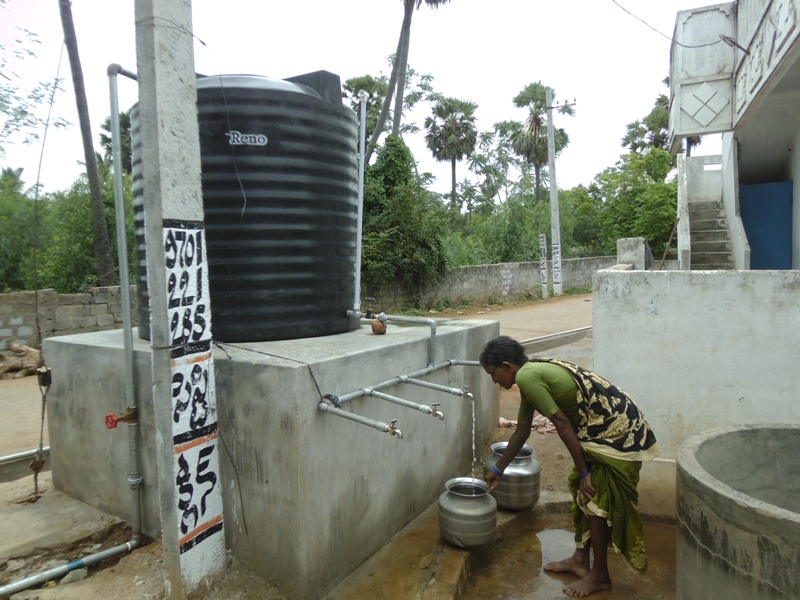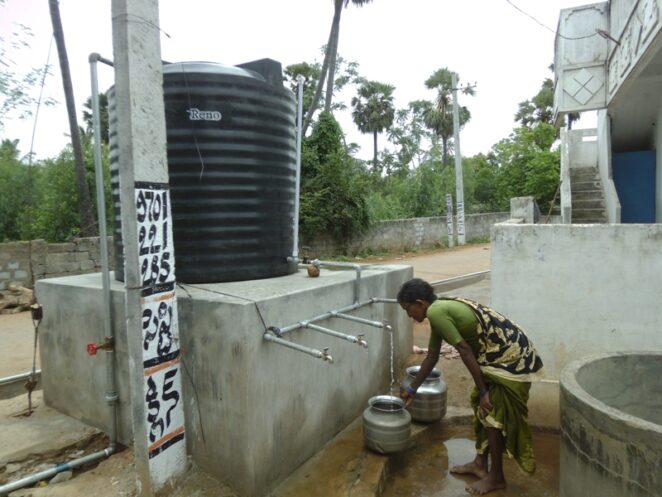Case-study /
Installing a drinking water purification and distribution system – Preventing water crises in the villages of Chepala Dibbada Palem and Chukkavani Palem, India


Central overhead water tank and supply taps
The communities of Chepala Dibbada Palem and Chikkavani Palem in Andhra Pradesh are located 1.5 km away from the coast of the Bay of Bengal. The villagers have been facing a severe scarcity of clean drinking water. The 488 inhabitants in Chepala Dibbada Palem and 324 in Chukkavanai Palem only relied on piped drinking water supply, hand pumps and dug wells to cover their drinking water needs. Changing rainfall patterns reduced water runoff from the reservoirs, resulting in a decreased dilution of waste water discharges in the river.
Additionally, short intense rainfalls led to strong currents in the river which eroded the purification capacity of the infiltration well from which the villagers got their water for domestic purposes. Both water quality and quantity are predicted to deteriorate or respectively become less and more unreliable in future. This trend is aggravated by climate change, if no measures are taken. The community’s existing Panchayat office is used as relief shelter to the homeless during extreme weather events and emergency situations. It was powered by the local grid. Disruption of power up to 18-24 hours during extreme weather events is making peoples life miserable and also hampering the relief operations and medical care of those sheltered in the Panchayat office.
Supported by the EU-financed AdaptCap project as well as the local Rural Water Supply Department, both villages decided to improve their drinking water quality and distribution system. The measures implemented include: pollution control within the catchment area and digging of a shallow borehole in the Gambhiragadda stream. The water is then pumped and stored in the central overhead tank located in the village. The borehole water is also tested both during and after monsoon season, for which the village leaders were provided with tools and the necessary training to test the tap water at 30 tap points. Sending the reports to the Panchayat helps in re-establishing confidence in the water sources. Individual unauthorized extensions to the distribution systems were removed while at the same time extending the network into previously not served housing blocks.
In addition, two ground level storage cum distribution water tanks each able to hold up to 2000 litre with 4 public taps were installed in locations determined by the RWS, the Panchayat, and local NGOs. The community is encouraged and made aware of how to use water appropriately to prevent loss. A water quality management plan was set up in collaboration with adjoining housing colonies in the catchment area to prevent further pollution of water sources. In total, approx. 810 villagers benefit from this adaptation measure. The village Panchayat office cum emergency shelter is powered with 6 solar panels having a total power output of 1000 W peak. The panels were installed on the roof of the Panchayat office. The system has 1.0 KWh backup facilities. Key benefits of the measure in Chepala Dibbada Palem and Chukkavani Palem are:
- Improve and ensure sufficient drinking water quantity: The adaptation measure assures the communities 20 litres of drinking water per head per day and a total of 7,300 litres per head per year. Annually, 5,927 m³ of drinking water are available for the entire population of 812 inhabitants in the villages of Chepala Dibbada Palem and Chukkavani Palem.
- Improve drinking water quality: The water quality is ensured by testing it and comparing it to the benchmark values of the IS 10500 standards.
- Save energy:The community is estimated to save 2,500 KWh per year as energy is provided via solar panels. The cost of energy has decreased considerably.
Implementation costs
The overall costs of this adaptation measure – including a local vulnerability and needs assessment, capacity building measures in the community, technical support as well as material and labour costs – amounted to Rs. 1,100,000. Originally, Rs. 1,000,000 were to be borne by AdaptCap, but as the State Government’s Rural Water Supply Department came forward to implement part of the works with its own funds, the project’s share was reduced to Rs. 400,000 of which the communities contributed Rs. 100,000. The total cost of the solar power unit is Rs.282,000, which has been completely contributed by the AdaptCap project.
Operation & maintenance of the system
In order to remain operative in the long run, several parts of the system require regular operation and maintenance (O&M). Regular O&M activities include:
- Catchment area protection from pollutants
- Cleaning of overhead tank and Sintex distribution tanks
- Arresting leakages along the pipeline and attending to necessary repairs
- Water quality testing and maintenance
- Cleaning and maintenance of solar panels, UPS, batteries
- Maintenance of charge control and A/C panel board
All O&M activities are taken care of by the Panchayat. The village Panchayat collects a water tax from the water users and if necessary, it also uses its own funds to maintain the scheme. The average monthly costs for O&M are Rs. 5,500. The scheme is handed over to the village Panchayat which will take care of its maintenance. The solar power unit was also handed over to the village Panchayat. It will take care of the O&M of the unit as well as its own funds. The O&M cost of the unit is Rs.2,500 per month.
M&E of activities and benefits
A monitoring and evaluation (M&E) system was developed to regularly screen and assess the adaptation project’s sustainability and impact. Information is collected in four areas:
- Effectively achieved vulnerability reduction
- Acceptance by and technical feasibility for the community
- Cost for implementation and regular O&M
- Positive and negative side effects (i.e., environmental, social, economic)
Challenges and lessons learnt
- Ensure a strong buy-in by the community and local authorities for the measure to achieve efficient and sustainable implementation.
- Community participation should be ensured throughout all phases of such an initiative. Pilot monitoring committees took an active part in the construction works. This helped establish the communities’ ownership over the adaptation measure.
- Ensure construction works take place outside of the rainy season and design the time schedule accordingly as rains and cyclones may obstruct and even damage the ongoing works. The construction works for this measure were delayed because as the work site was flooded.
- Ensure financing of construction is available, fully approved and each participating party is aware of their financial obligations before starting construction works. Building the adaptation measure could not commence as planned as there were financing issues between the central government and the Rural Water Supply Department (RWS). As a result, the RWS took up improvement works at the water sources, while the distribution system was improved and expanded within the scope of the AdaptCap project.
Project background and partners
The project “AdaptCap – Strengthening Adaptation Capacities and Minimizing Risks of Vulnerable Coastal Communities in India” financed by the European Commission has set out to strengthen the adaptation capacities of vulnerable coastal communities in Andhra Pradesh and Tamil Nadu (India) and minimize their climate change-related risks using an integrated approach.
The three-year initiative is implemented by the Indo-German Environment Partnership Programme of Deutsche Gesellschaft für Internationale Zusammenarbeit (GIZ-IGEP) in partnership with four Indian and international partners.
GIZ-IGEP is responsible for the overall implementation and project management.
Academy of Gandhian Studies (AGS) supports the stakeholders in three cities and nine villages in Andhra Pradesh as a local partner, providing training and implementation support in assessing adaptation needs and developing and carrying out adaptation measures.
AVVAI Village Welfare Society (AVVAI) fulfils the same role in Tamil Nadu.
adelphi contributed to developing technology solutions for the pilot projects and M&E frameworks, designing and implementing capacity building programmes and providing technical support for pilot project implementation.
ICLEI South Asia led the implementation of activities in the six urban areas targeted by AdaptCap.
